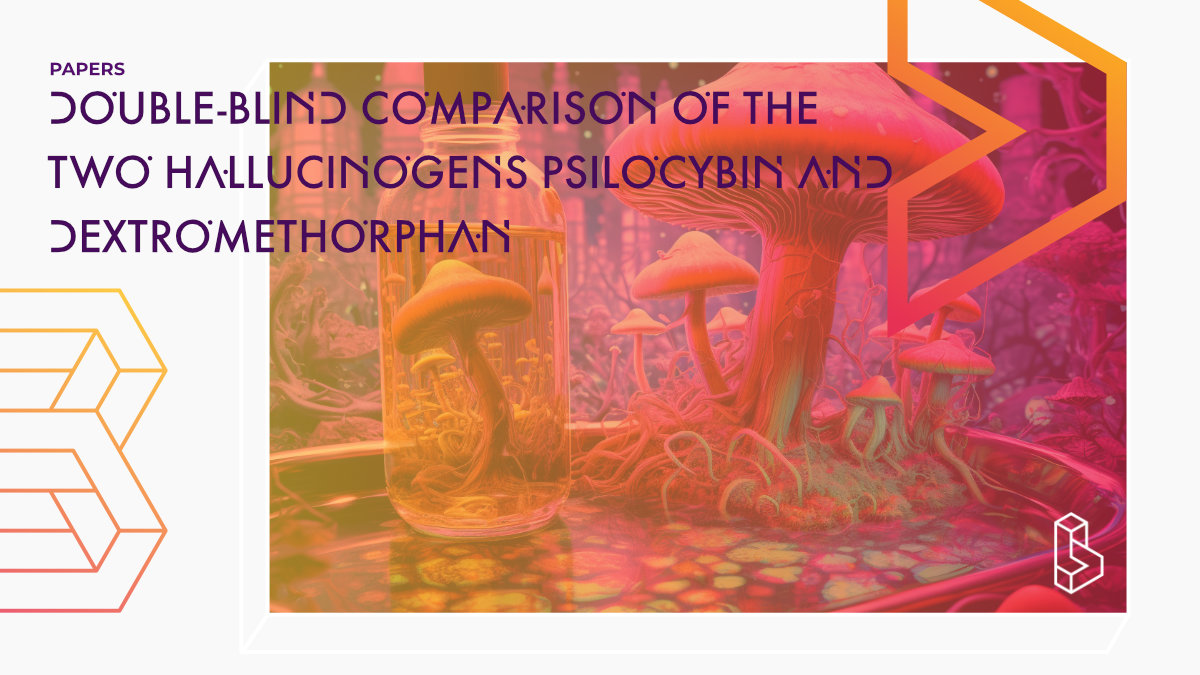This double-blind, placebo-controlled study (n=20) with psilocybin (10, 20, 30mg/70kg) and DMX (400mg/70kg) finds very similar subjective effects between the two drugs. The visual, mystical, and insightful effects were more pronounced with psilocybin, disembodiment with DMX.
Abstract of Double-blind comparison of the two hallucinogens psilocybin and dextromethorphan
“Rationale Although psilocybin and dextromethorphan (DXM) are hallucinogens, they have different receptor mechanisms of action and have not been directly compared.
Objective This study compared subjective, behavioral, and physiological effects of psilocybin and dextromethorphan under conditions that minimized expectancy effects.
Methods Single, acute oral doses of psilocybin (10, 20, 30 mg/70 kg), DXM (400 mg/70 kg), and placebo were administered under double-blind conditions to 20 healthy participants with histories of hallucinogen use. Instructions to participants and staff minimized expectancy effects. Various subjective, behavioral, and physiological effects were assessed after drug administration.
Results High doses of both drugs produced similar increases in participant ratings of peak overall drug effect strength, with similar times to maximal effect and time-course. Psilocybin produced orderly dose-related increases on most participants rated subjective measures previously shown sensitive to hallucinogens. DXM produced increases on most of these same measures. However, the high dose of psilocybin produced significantly greater and more diverse visual effects than DXM including greater movement and more frequent, brighter, distinctive, and complex (including textured and kaleidoscopic) images and visions. Compared to DXM, psilocybin also produced significantly greater mystical-type and psychologically insightful experiences and greater absorption in music. In contrast, DXM produced larger effects than psilocybin on measures of disembodiment, nausea/emesis, and light-headedness. Both drugs increased systolic blood pressure, heart rate, and pupil dilation and decreased psychomotor performance and balance.
Conclusions Psilocybin and DXM produced similar profiles of subjective experiences, with psilocybin producing relatively greater visual, mystical-type, insightful, and musical experiences, and DXM producing greater disembodiment.”
Authors: Theresa M. Carbonaro, Matthew W. Johnson, Ethan Hurwitz & Roland R. Griffiths
Notes on Double-blind comparison of the two hallucinogens psilocybin and dextromethorphan
This paper works with the same dataset/participants as Barrett and colleagues (2018) who studied the effects on cognition.
Summary of Double-blind comparison of the two hallucinogens psilocybin and dextromethorphan
Classic and atypical hallucinogens produce unique changes in thoughts, perceptions, and emotions, often including alterations in the perception of reality and meaning.
Psilocybin and psilocin are the principal psychoactive components in Psilocybe mushrooms. Psilocin effects are primarily mediated via serotonin (5-HT) receptors, predominantly the 5-HT2A receptor as well as the 5-HT1A and 5-HT2C receptors.
Find this paper
https://doi.org/10.1007/s00213-017-4769-4
Open Access | Google Scholar | Backup | 🕊
Cite this paper (APA)
Carbonaro, T. M., Johnson, M. W., Hurwitz, E., & Griffiths, R. R. (2018). Double-blind comparison of the two hallucinogens psilocybin and dextromethorphan: similarities and differences in subjective experiences. Psychopharmacology, 235, 521-534.
Study details
Compounds studied
Psilocybin
Topics studied
Safety
Healthy Subjects
Study characteristics
Original
Placebo-Controlled
Active Placebo
Double-Blind
Single-Blind
Within-Subject
Randomized
Participants
20
Humans
Authors
Authors associated with this publication with profiles on Blossom
Roland GriffithsRoland R. Griffiths is one of the strongest voices in psychedelics research. With over 400 journal articles under his belt and as one of the first researchers in the psychedelics renaissance, he has been a vital part of the research community.
Matthew Johnson
Matthew Johnson is an Associate Professor of Psychiatry and Behavioral Sciences at Johns Hopkins University. His research is concerned with addiction medicine, drug abuse, and drug dependence.
Institutes
Institutes associated with this publication
Johns Hopkins UniversityJohns Hopkins University (Medicine) is host to the Center for Psychedelic and Consciousness Research, which is one of the leading research institutes into psychedelics. The center is led by Roland Griffiths and Matthew Johnson.
Compound Details
The psychedelics given at which dose and how many times
Psilocybin 10 - 30mg | 3x
Linked Research Papers
Notable research papers that build on or are influenced by this paper
Double-Blind Comparison of the Two Hallucinogens Dextromethorphan and Psilocybin: Experience-Dependent and Enduring Psychological Effects in Healthy VolunteersThis double-blind experimental study (n=20) compares the effects of high-dose dextromethorphan (DXM; 400mg/70kg) to psilocybin (10, 20, 30mg/70kg) under conditions typical of therapeutic psychedelic trials. DXM and psilocybin showed increases over placebo in ratings of experiences predictive of psychological benefit at 1 week. However, psilocybin's effects were dose-dependent and more favourable, while DXM had poorer physical tolerability.
Double-blind comparison of the two hallucinogens psilocybin and dextromethorphan: effects on cognition
This double-blind, placebo-controlled study (n=20) with psilocybin (10, 20, 30mg/70kg) and DMX (400mg/70kg) finds no global cognitive impairment. The study does find (for both drugs) effects on psychomotor performance, working memory, episodic memory, associative learning, and visual perception.
Linked Clinical Trial
Effects of Hallucinogens and Other Drugs on Mood and PerformanceThis non-treatment study will investigate the effects on mood and performance caused by hallucinogens and other psychoactive compounds.
